#amazon elastic compute cloud
Explore tagged Tumblr posts
Text
How to create an EC2 Instance
Amazon Elastic Compute Cloud (Amazon EC2) is a web service that provides secure, resizable computing capacity in the cloud. Amazon EC2 offers many options that help you build and run virtually any application. With these possibilities, getting started with EC2 is quick and easy to do. In this article, we shall discuss how to create an EC2 Instance. Please see the Various ways to restart an AWS…
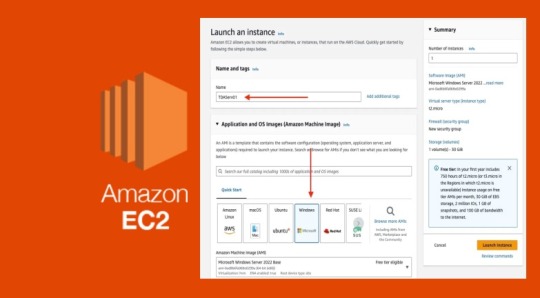
View On WordPress
#Amazon EC2#Amazon Elastic Compute Cloud#Amazon Web Services#AWS#EC2#EC2 instance#EC2 Instances#EC2 Launch#EC2Launch
0 notes
Text
Amazon Elastic Block Store, commonly known as EBS, is a significant component of Amazon Web Services (AWS) storage services, offering a versatile and reliable solution for managing data storage in the cloud. EBS allows users to create and attach block storage volumes to Amazon Elastic Compute Cloud (EC2) instances, making it an integral part of building scalable and high-performance applications on the AWS platform.
#amazon elastic block store#ebs#amazon web services#aws#ec2#amazon elastic compute cloud#cybersecurity#security#infosectrain#learntorise
0 notes
Text
Top 5 Container Management Software Of 2024

Container Management Software is essential for businesses aiming to efficiently manage their applications across various environments. As the market for this technology is projected to grow significantly, here’s a look at the top five Container Management Software solutions for 2024:
Portainer: Established in 2017, Portainer is known for its easy-to-use interface supporting Docker, Kubernetes, and Swarm. It offers features like real-time monitoring and role-based access control, making it suitable for both cloud and on-premises environments.
Amazon Elastic Container Service (ECS): This AWS service simplifies deploying and managing containerized applications, integrating seamlessly with other AWS tools. It supports features like automatic load balancing and serverless management through AWS Fargate.
Docker: Since 2010, Docker has been a pioneer in containerization. It provides tools for building, shipping, and running applications within containers, including Docker Engine and Docker Compose. Docker Swarm enables cluster management and scaling.
DigitalOcean Kubernetes: Known for its user-friendly approach, DigitalOcean’s Kubernetes offering helps manage containerized applications with automated updates and monitoring. It integrates well with other DigitalOcean services.
Kubernetes: Developed by Google and now managed by CNCF, Kubernetes is a leading tool for managing containerized applications with features like automatic scaling and load balancing. It supports customizations and various networking plugins.
Conclusion: Selecting the right Container Management Software is crucial for optimizing your deployment processes and scaling applications efficiently. Choose a solution that meets your business’s specific needs and enhances your digital capabilities.
0 notes
Text

code
#codeonedigest#cloud#aws#docker container#java#nodejs#javascript#docker image#dockerfile#docker file#ec2#ecs#elastic container service#elastic cloud computing#amazon ec2#amazon ecs#microservice#solid principle#python#kubernetes#salesforce#shopify#microservice design pattern#solid principles#java design pattern
0 notes
Text
Why AWS is the Best Cloud Hosting Partner for Your Organization – Proven Benefits and Features
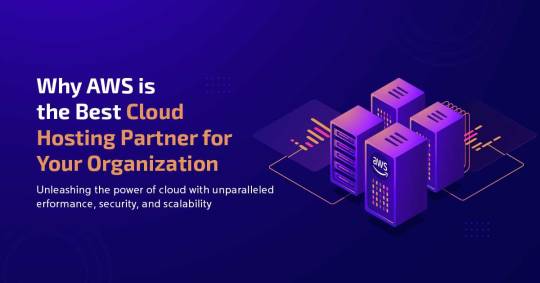
More entrepreneurs like e-store owners prefer Amazon Web Services (AWS) for cloud hosting services this year. This article will single out countless reasons to consider this partner for efficient AWS hosting today.
5 Enticing Features of AWS that Make It Perfect for You
The following are the main characteristics of Amazon Web Services (AWS) in 2024.
Scalable
The beauty of AWS is that a client can raise or lower their computing capability based on business demands.
Highly Secure
Secondly, AWS implements countless security measures to ensure the safety of a client’s data. For example, AWS complies with all the set data safety standards to avoid getting lawsuits from disgruntled clients.
Amazon secures all its data centers to ensure no criminal can access them for a nefarious purpose.
Free Calculator
Interestingly, AWS proffers this tool to help new clients get an estimate of the total hosting cost based on their business needs. The business owner only needs to indicate their location, interested services, and their zone.
Pay-As-You-Go Pricing Option
New clients prefer this company for AWS hosting services because this option lets them pay based on the resources they add to this platform.
User-Friendly
AWS is the best hosting platform because it has a user-oriented interface. For example, the provider has multiple navigation links plus instructional videos to enable the clients to use this platform.
Clients can edit updated data whenever they choose or add new company data to their accounts.
Unexpected Advantages of Seeking AWS Hosting Services
Below are the scientific merits of relying on Amazon Web Services (AWS) for web design and cloud computing services.
Relatively Fair Pricing Models
Firstly, the AWS hosting service provider offers well-thought-out pricing options to ensure the client only pays for the resources they utilize. For example, you can get a monthly option if you have many long-term projects.
Limitless Server Capacity
AWS offers a reasonable hosting capacity to each client to enable them to store as much company data as possible. Therefore, this cloud hosting partner ensures that employees can access crucial files to complete activities conveniently.
Upholds Confidentiality
AWS has at least twelve (12) data centers in different parts of the world. Further, this provider’s system is relatively robust and secure to safeguard sensitive clients’ data 24/7.
High-Performance Computing
Unlike other cloud hosting sites, AWS can process meta-data within seconds, enabling employees to meet their daily goals.
Highly Reliable
Unknown to some, over 1M clients in various countries rely on AWS for web development or hosting services. Additionally, AWS is available in over 200 countries spread across different continents.
Finally, AWS’s technical team spares no effort to implement new technologies to safeguard their clients’ data and woo new ones.
Summary
In closing, the beauty of considering this partner for AWS hosting is that it has a simple layout-hence ideal for everyone, including non-techies. Additionally, the fact that this partner is elastic ensures that this system can shrink or expand based on the files you add.
At its core, AWS offers various cloud services, such as storage options, computing power, and networking through advanced technology. NTSPL Hosting offers various features on AWS hosting aimed at improving the scalability of cloud infrastructure for less downtimes. Some of the services NTSPL Hosting offers include pioneering server administration, version control, and system patching. Given that it offers round the clock customer service; it is a good option for those looking for a solid AWS hosting solution.
Source: NTSPL Hosting
3 notes
·
View notes
Text
CLOUD COMPUTING: A CONCEPT OF NEW ERA FOR DATA SCIENCE

Cloud Computing is the most interesting and evolving topic in computing in the recent decade. The concept of storing data or accessing software from another computer that you are not aware of seems to be confusing to many users. Most the people/organizations that use cloud computing on their daily basis claim that they do not understand the subject of cloud computing. But the concept of cloud computing is not as confusing as it sounds. Cloud Computing is a type of service where the computer resources are sent over a network. In simple words, the concept of cloud computing can be compared to the electricity supply that we daily use. We do not have to bother how the electricity is made and transported to our houses or we do not have to worry from where the electricity is coming from, all we do is just use it. The ideology behind the cloud computing is also the same: People/organizations can simply use it. This concept is a huge and major development of the decade in computing.
Cloud computing is a service that is provided to the user who can sit in one location and remotely access the data or software or program applications from another location. Usually, this process is done with the use of a web browser over a network i.e., in most cases over the internet. Nowadays browsers and the internet are easily usable on almost all the devices that people are using these days. If the user wants to access a file in his device and does not have the necessary software to access that file, then the user would take the help of cloud computing to access that file with the help of the internet.
Cloud computing provide over hundreds and thousands of services and one of the most used services of cloud computing is the cloud storage. All these services are accessible to the public throughout the globe and they do not require to have the software on their devices. The general public can access and utilize these services from the cloud with the help of the internet. These services will be free to an extent and then later the users will be billed for further usage. Few of the well-known cloud services that are drop box, Sugar Sync, Amazon Cloud Drive, Google Docs etc.
Finally, that the use of cloud services is not guaranteed let it be because of the technical problems or because the services go out of business. The example they have used is about the Mega upload, a service that was banned and closed by the government of U.S and the FBI for their illegal file sharing allegations. And due to this, they had to delete all the files in their storage and due to which the customers cannot get their files back from the storage.
Service Models Cloud Software as a Service Use the provider's applications running on a cloud infrastructure Accessible from various client devices through thin client interface such as a web browser Consumer does not manage or control the underlying cloud infrastructure including network, servers, operating systems, storage
Google Apps, Microsoft Office 365, Petrosoft, Onlive, GT Nexus, Marketo, Casengo, TradeCard, Rally Software, Salesforce, ExactTarget and CallidusCloud
Cloud Platform as a Service Cloud providers deliver a computing platform, typically including operating system, programming language execution environment, database, and web server Application developers can develop and run their software solutions on a cloud platform without the cost and complexity of buying and managing the underlying hardware and software layers
AWS Elastic Beanstalk, Cloud Foundry, Heroku, Force.com, Engine Yard, Mendix, OpenShift, Google App Engine, AppScale, Windows Azure Cloud Services, OrangeScape and Jelastic.
Cloud Infrastructure as a Service Cloud provider offers processing, storage, networks, and other fundamental computing resources Consumer is able to deploy and run arbitrary software, which can include operating systems and applications Amazon EC2, Google Compute Engine, HP Cloud, Joyent, Linode, NaviSite, Rackspace, Windows Azure, ReadySpace Cloud Services, and Internap Agile
Deployment Models Private Cloud: Cloud infrastructure is operated solely for an organization Community Cloud : Shared by several organizations and supports a specific community that has shared concerns Public Cloud: Cloud infrastructure is made available to the general public Hybrid Cloud: Cloud infrastructure is a composition of two or more clouds
Advantages of Cloud Computing • Improved performance • Better performance for large programs • Unlimited storage capacity and computing power • Reduced software costs • Universal document access • Just computer with internet connection is required • Instant software updates • No need to pay for or download an upgrade
Disadvantages of Cloud Computing • Requires a constant Internet connection • Does not work well with low-speed connections • Even with a fast connection, web-based applications can sometimes be slower than accessing a similar software program on your desktop PC • Everything about the program, from the interface to the current document, has to be sent back and forth from your computer to the computers in the cloud
About Rang Technologies: Headquartered in New Jersey, Rang Technologies has dedicated over a decade delivering innovative solutions and best talent to help businesses get the most out of the latest technologies in their digital transformation journey. Read More...
#CloudComputing#CloudTech#HybridCloud#ArtificialIntelligence#MachineLearning#Rangtechnologies#Ranghealthcare#Ranglifesciences
9 notes
·
View notes
Text
Exploring the Power of Amazon Web Services: Top AWS Services You Need to Know
In the ever-evolving realm of cloud computing, Amazon Web Services (AWS) has established itself as an undeniable force to be reckoned with. AWS's vast and diverse array of services has positioned it as a dominant player, catering to the evolving needs of businesses, startups, and individuals worldwide. Its popularity transcends boundaries, making it the preferred choice for a myriad of use cases, from startups launching their first web applications to established enterprises managing complex networks of services. This blog embarks on an exploratory journey into the boundless world of AWS, delving deep into some of its most sought-after and pivotal services.

As the digital landscape continues to expand, understanding these AWS services and their significance is pivotal, whether you're a seasoned cloud expert or someone taking the first steps in your cloud computing journey. Join us as we delve into the intricate web of AWS's top services and discover how they can shape the future of your cloud computing endeavors. From cloud novices to seasoned professionals, the AWS ecosystem holds the keys to innovation and transformation.
Amazon EC2 (Elastic Compute Cloud): The Foundation of Scalability At the core of AWS's capabilities is Amazon EC2, the Elastic Compute Cloud. EC2 provides resizable compute capacity in the cloud, allowing you to run virtual servers, commonly referred to as instances. These instances serve as the foundation for a multitude of AWS solutions, offering the scalability and flexibility required to meet diverse application and workload demands. Whether you're a startup launching your first web application or an enterprise managing a complex network of services, EC2 ensures that you have the computational resources you need, precisely when you need them.
Amazon S3 (Simple Storage Service): Secure, Scalable, and Cost-Effective Data Storage When it comes to storing and retrieving data, Amazon S3, the Simple Storage Service, stands as an indispensable tool in the AWS arsenal. S3 offers a scalable and highly durable object storage service that is designed for data security and cost-effectiveness. This service is the choice of businesses and individuals for storing a wide range of data, including media files, backups, and data archives. Its flexibility and reliability make it a prime choice for safeguarding your digital assets and ensuring they are readily accessible.
Amazon RDS (Relational Database Service): Streamlined Database Management Database management can be a complex task, but AWS simplifies it with Amazon RDS, the Relational Database Service. RDS automates many common database management tasks, including patching, backups, and scaling. It supports multiple database engines, including popular options like MySQL, PostgreSQL, and SQL Server. This service allows you to focus on your application while AWS handles the underlying database infrastructure. Whether you're building a content management system, an e-commerce platform, or a mobile app, RDS streamlines your database operations.
AWS Lambda: The Era of Serverless Computing Serverless computing has transformed the way applications are built and deployed, and AWS Lambda is at the forefront of this revolution. Lambda is a serverless compute service that enables you to run code without the need for server provisioning or management. It's the perfect solution for building serverless applications, microservices, and automating tasks. The unique pricing model ensures that you pay only for the compute time your code actually uses. This service empowers developers to focus on coding, knowing that AWS will handle the operational complexities behind the scenes.
Amazon DynamoDB: Low Latency, High Scalability NoSQL Database Amazon DynamoDB is a managed NoSQL database service that stands out for its low latency and exceptional scalability. It's a popular choice for applications with variable workloads, such as gaming platforms, IoT solutions, and real-time data processing systems. DynamoDB automatically scales to meet the demands of your applications, ensuring consistent, single-digit millisecond latency at any scale. Whether you're managing user profiles, session data, or real-time analytics, DynamoDB is designed to meet your performance needs.
Amazon VPC (Virtual Private Cloud): Tailored Networking for Security and Control Security and control over your cloud resources are paramount, and Amazon VPC (Virtual Private Cloud) empowers you to create isolated networks within the AWS cloud. This isolation enhances security and control, allowing you to define your network topology, configure routing, and manage access. VPC is the go-to solution for businesses and individuals who require a network environment that mirrors the security and control of traditional on-premises data centers.
Amazon SNS (Simple Notification Service): Seamless Communication Across Channels Effective communication is a cornerstone of modern applications, and Amazon SNS (Simple Notification Service) is designed to facilitate seamless communication across various channels. This fully managed messaging service enables you to send notifications to a distributed set of recipients, whether through email, SMS, or mobile devices. SNS is an essential component of applications that require real-time updates and notifications to keep users informed and engaged.
Amazon SQS (Simple Queue Service): Decoupling for Scalable Applications Decoupling components of a cloud application is crucial for scalability, and Amazon SQS (Simple Queue Service) is a fully managed message queuing service designed for this purpose. It ensures reliable and scalable communication between different parts of your application, helping you create systems that can handle varying workloads efficiently. SQS is a valuable tool for building robust, distributed applications that can adapt to changes in demand.
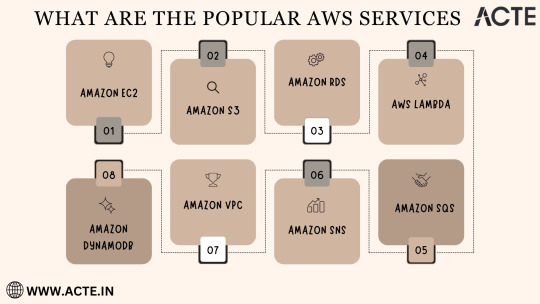
In the rapidly evolving landscape of cloud computing, Amazon Web Services (AWS) stands as a colossus, offering a diverse array of services that address the ever-evolving needs of businesses, startups, and individuals alike. AWS's popularity transcends industry boundaries, making it the go-to choice for a wide range of use cases, from startups launching their inaugural web applications to established enterprises managing intricate networks of services.
To unlock the full potential of these AWS services, gaining comprehensive knowledge and hands-on experience is key. ACTE Technologies, a renowned training provider, offers specialized AWS training programs designed to provide practical skills and in-depth understanding. These programs equip you with the tools needed to navigate and excel in the dynamic world of cloud computing.
With AWS services at your disposal, the possibilities are endless, and innovation knows no bounds. Join the ever-growing community of cloud professionals and enthusiasts, and empower yourself to shape the future of the digital landscape. ACTE Technologies is your trusted guide on this journey, providing the knowledge and support needed to thrive in the world of AWS and cloud computing.
8 notes
·
View notes
Text
Brazil VPS Hosting: Quick & Inexpensive Virtual Private Servers
When it comes to finding quick and inexpensive Virtual Private Servers (VPS) hosting in Brazil, there are several providers you can consider. Here are a few options:
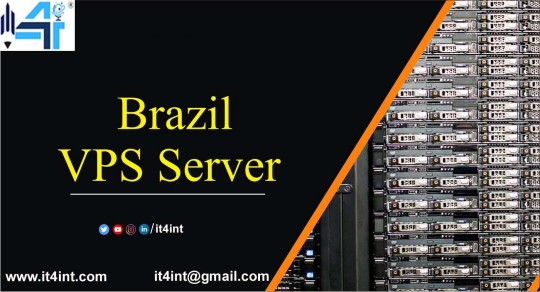
Hostinger: Hostinger offers VPS hosting with data centers in São Paulo, Brazil. They provide quick setup and competitive pricing for their VPS plans.
DigitalOcean: DigitalOcean has a data center in São Paulo, offering VPS hosting with SSD storage and a user-friendly interface for quick deployment.
Vultr: Vultr also has a presence in São Paulo and provides affordable VPS hosting with SSD storage, high-performance CPUs, and a range of data center locations globally.
Linode: Linode offers Brazil VPS hosting with a data center in São Paulo. They provide quick setup, SSD storage, and a variety of plans to choose from.
Amazon Web Services (AWS): AWS has a São Paulo region offering Elastic Compute Cloud (EC2) instances, which can be configured as VPS. While AWS may not always be the cheapest option, it provides scalability and reliability.
Before choosing a provider, consider factors such as server specifications, uptime guarantees, customer support quality, and scalability options. Additionally, make sure to check for any ongoing promotions or discounts that could help you save money on your VPS hosting.
#brazil windows vps#Brazil vps server pric#Best brazil vps server#buy vps server#Brazil vps price#VPS
2 notes
·
View notes
Text
Navigating the Cloud Landscape: Unleashing Amazon Web Services (AWS) Potential
In the ever-evolving tech landscape, businesses are in a constant quest for innovation, scalability, and operational optimization. Enter Amazon Web Services (AWS), a robust cloud computing juggernaut offering a versatile suite of services tailored to diverse business requirements. This blog explores the myriad applications of AWS across various sectors, providing a transformative journey through the cloud.
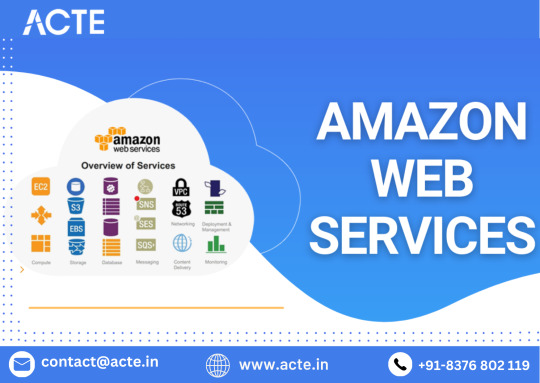
Harnessing Computational Agility with Amazon EC2
Central to the AWS ecosystem is Amazon EC2 (Elastic Compute Cloud), a pivotal player reshaping the cloud computing paradigm. Offering scalable virtual servers, EC2 empowers users to seamlessly run applications and manage computing resources. This adaptability enables businesses to dynamically adjust computational capacity, ensuring optimal performance and cost-effectiveness.
Redefining Storage Solutions
AWS addresses the critical need for scalable and secure storage through services such as Amazon S3 (Simple Storage Service) and Amazon EBS (Elastic Block Store). S3 acts as a dependable object storage solution for data backup, archiving, and content distribution. Meanwhile, EBS provides persistent block-level storage designed for EC2 instances, guaranteeing data integrity and accessibility.
Streamlined Database Management: Amazon RDS and DynamoDB
Database management undergoes a transformation with Amazon RDS, simplifying the setup, operation, and scaling of relational databases. Be it MySQL, PostgreSQL, or SQL Server, RDS provides a frictionless environment for managing diverse database workloads. For enthusiasts of NoSQL, Amazon DynamoDB steps in as a swift and flexible solution for document and key-value data storage.
Networking Mastery: Amazon VPC and Route 53
AWS empowers users to construct a virtual sanctuary for their resources through Amazon VPC (Virtual Private Cloud). This virtual network facilitates the launch of AWS resources within a user-defined space, enhancing security and control. Simultaneously, Amazon Route 53, a scalable DNS web service, ensures seamless routing of end-user requests to globally distributed endpoints.
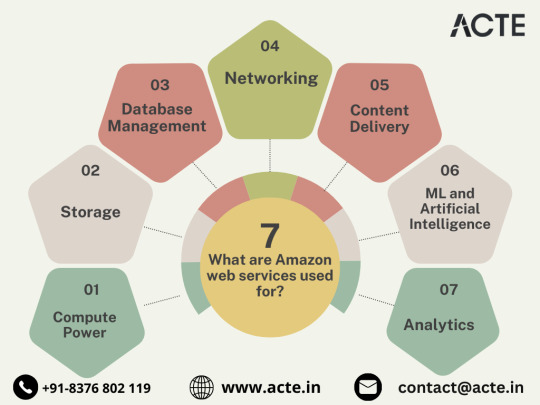
Global Content Delivery Excellence with Amazon CloudFront
Amazon CloudFront emerges as a dynamic content delivery network (CDN) service, securely delivering data, videos, applications, and APIs on a global scale. This ensures low latency and high transfer speeds, elevating user experiences across diverse geographical locations.
AI and ML Prowess Unleashed
AWS propels businesses into the future with advanced machine learning and artificial intelligence services. Amazon SageMaker, a fully managed service, enables developers to rapidly build, train, and deploy machine learning models. Additionally, Amazon Rekognition provides sophisticated image and video analysis, supporting applications in facial recognition, object detection, and content moderation.
Big Data Mastery: Amazon Redshift and Athena
For organizations grappling with massive datasets, AWS offers Amazon Redshift, a fully managed data warehouse service. It facilitates the execution of complex queries on large datasets, empowering informed decision-making. Simultaneously, Amazon Athena allows users to analyze data in Amazon S3 using standard SQL queries, unlocking invaluable insights.
In conclusion, Amazon Web Services (AWS) stands as an all-encompassing cloud computing platform, empowering businesses to innovate, scale, and optimize operations. From adaptable compute power and secure storage solutions to cutting-edge AI and ML capabilities, AWS serves as a robust foundation for organizations navigating the digital frontier. Embrace the limitless potential of cloud computing with AWS – where innovation knows no bounds.
3 notes
·
View notes
Text
Kickstart Your Cloud Journey with AWS Training in Pune
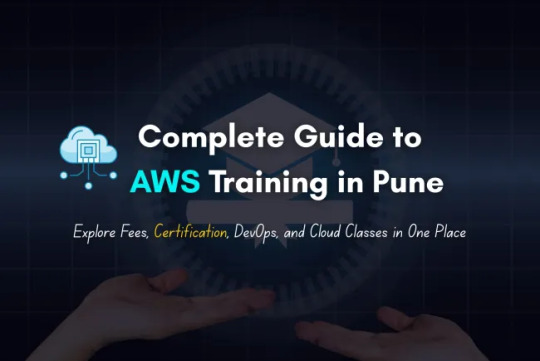
Cloud computing is reshaping the way organizations operate—and at the heart of this revolution is Amazon Web Services (AWS). If you're looking to build a future-proof career in cloud technology, enrolling in AWS Cloud Training in Pune is your first step toward success. With expert mentorship and hands-on training, WebAsha Technologies helps you gain the skills needed to thrive in today’s cloud-driven job market.
Why AWS Skills Are Essential and Beyond
Amazon Web Services (AWS) leads the cloud services industry, offering over 200 fully featured services for computing, storage, database, machine learning, and more. As cloud adoption accelerates across sectors, the demand for skilled AWS professionals continues to grow.
Top Benefits of Learning AWS:
High-paying job opportunities
Versatile roles across industries
Scalable skills for modern IT careers
Foundation for DevOps and cloud-native development
Why Choose WebAsha Technologies for AWS Training Programs in Pune?
At WebAsha Technologies, we are committed to turning learners into cloud professionals. Our AWS Cloud Training in Pune is designed for both beginners and working professionals who want to upskill or transition into cloud computing.
Key Features of Our AWS Training:
Certified and Experienced Instructors
Hands-on Practice with Real-Time Projects
Dedicated Lab Access for Cloud Experiments
Updated Curriculum Aligned with AWS Certification Tracks
Placement Support and Career Guidance
Who Should Enroll in AWS Cloud Training?
Our AWS programs are suitable for:
Fresh Graduates aspiring to enter the IT sector
IT Professionals looking to upgrade their skills
System Admins and Network Engineers
Software Developers and DevOps Engineers
Entrepreneurs planning to deploy scalable applications
What You Will Learn in the AWS Training Program
Our training covers everything you need to become cloud-ready and certification-ready.
Course Modules Include:
Introduction to Cloud Computing & AWS Overview
EC2, S3, and EBS – AWS Compute and Storage Services
VPC, Subnetting, and Network Security
IAM – Identity and Access Management
Elastic Load Balancer & Auto Scaling
RDS, DynamoDB – Database Services
CloudFormation, CloudWatch & Billing
Serverless Computing with AWS Lambda
Practice Tests & Real-Time Case Studies
Career Outcomes After AWS Training
After completing your training with us, you'll be prepared to pursue certifications like:
AWS Certified Cloud Practitioner
AWS Certified Solutions Architect – Associate
AWS Certified Developer – Associate
AWS Certified DevOps Engineer – Professional
Conclusion: Begin Your AWS Cloud Journey with Confidence
Don’t wait for opportunities—create them by building cloud expertise. The AWS Cloud Training in Pune by WebAsha Technologies is your launchpad into one of the most in-demand fields in the world. With expert trainers, real-world projects, and career support, you’ll be fully equipped to succeed in today’s competitive tech landscape.
0 notes
Text
Boost Your Cloud Career with an AWS Course in Pune
As cloud computing continues to revolutionize how businesses operate, Amazon Web Services (AWS) remains at the forefront of this transformation. Whether you're a student, IT professional, or someone looking to shift careers, enrolling in an AWS course in Pune can provide you with the essential skills to succeed in today’s tech industry.
Why Choose Pune for AWS Training?
Pune has emerged as one of India’s leading IT and education hubs, attracting numerous tech companies and skilled professionals. The city boasts a vibrant tech ecosystem with a strong demand for cloud computing experts. Taking an AWS course in Pune gives learners access to top training institutes, expert instructors, and hands-on learning environments.
Moreover, Pune’s affordability and quality of life make it a preferred destination for students and working professionals alike.
What You Learn in an AWS Course
An AWS course in Pune typically covers all major aspects of Amazon Web Services, preparing you for industry certifications and real-world implementation. Core topics include:
Cloud Fundamentals: Understanding the basics of cloud computing and AWS architecture.
Compute and Storage Services: Using EC2, S3, EBS, and other critical services.
Networking & Security: Managing VPCs, IAM roles, and encryption protocols.
DevOps Tools: Automating cloud operations using AWS CLI, CloudFormation, and Elastic Beanstalk.
Databases and Serverless: Working with RDS, DynamoDB, Lambda, and more.
Many courses also include lab sessions, live projects, and preparation for AWS certification exams like AWS Certified Solutions Architect or AWS Certified Developer.
Who Can Enroll in the Course?
An AWS course in Pune is suitable for a wide range of individuals—fresh graduates, software developers, system administrators, DevOps engineers, and even project managers. You don't need advanced programming skills to begin; a basic understanding of IT concepts is usually sufficient.
The flexibility of course formats—weekend batches, online training, and fast-track options—makes it easier for working professionals to learn without interrupting their current jobs.
Career Opportunities After the Course
The demand for cloud professionals is growing rapidly across sectors like IT, banking, healthcare, e-commerce, and telecom. After completing an AWS course in Pune, you can pursue roles such as:
Cloud Engineer
AWS Developer
Solutions Architect
DevOps Engineer
Cloud Consultant
Having AWS skills on your resume greatly improves your job prospects and earning potential. Pune, with its expanding tech landscape, offers plenty of job openings for AWS-certified professionals.
Conclusion
An AWS course in Pune https://www.apponix.com/AWS-Essentials-Solutions-Architect/AWS-training-in-Pune.html is more than just a certification—it's a gateway to a high-growth, future-proof career in cloud computing. With quality training options, hands-on projects, and proximity to major IT firms, Pune is an ideal city to start your cloud journey. Whether you're looking to enhance your skills or pivot your career, now is the perfect time to invest in AWS training and embrace the cloud revolution.
0 notes
Text
Exploring AWS Cloud Services: A Key Player in Seattle’s Tech Landscape
Amazon Web Services (AWS) is a global leader in cloud computing, providing scalable and reliable cloud infrastructure to businesses of all sizes.
Headquartered in Seattle, AWS offers a suite of cloud services that enable organizations to innovate faster, reduce IT costs, and scale efficiently.
This blog will explore the importance of AWS Cloud Services, particularly in Seattle, a city that has become a hub for tech innovation and enterprise growth, with an emphasis on AWS Cloud Consulting Services in Seattle.
What are AWS Cloud Services?
AWS provides a vast array of cloud solutions, ranging from computing power and storage to machine learning and artificial intelligence.
These services are designed to support a variety of business needs, from startups to large enterprises. Some of the core AWS services include Amazon EC2 (for scalable computing), Amazon S3 (for object storage), and AWS Lambda (for serverless computing).
AWS’s global infrastructure, including its extensive network of data centers, ensures that services are delivered with high availability and low latency.
AWS Cloud Services in Seattle
Seattle, the home of Amazon, plays a pivotal role in the global cloud computing industry, and AWS Cloud Services in Seattle are central to the city's booming tech ecosystem.
From small startups to large enterprises, businesses in Seattle are increasingly relying on AWS’s flexible, secure, and cost-effective solutions. With services like AWS Elastic Beanstalk, Amazon RDS, and Amazon SageMaker for machine learning, local companies are able to scale quickly and innovate faster than ever before.
AWS Cloud Consulting Services in Seattle
For businesses in Seattle, AWS Cloud Consulting Services are invaluable. These services help organizations plan, migrate, and optimize their cloud infrastructure, ensuring they get the most out of their AWS investment.
Local AWS consultants are experts in navigating the complexities of cloud adoption, from architecture design to cost optimization.
Whether a business is transitioning to the cloud or looking to optimize an existing AWS setup, AWS consulting services can guide them through best practices and help minimize risks.
Seattle’s thriving tech community is home to numerous AWS-certified consultants and consulting firms that offer personalized solutions tailored to specific business needs.
Companies like KPMG, Slalom Consulting, and many specialized AWS partners are well-positioned to assist businesses in Seattle with cloud strategies, security assessments, and performance optimization on AWS.
The Future of AWS in Seattle
As AWS continues to expand its services and infrastructure globally, Seattle remains at the heart of this transformation.
With local data centers and a robust tech talent pool, the city is well-positioned to be a leader in cloud innovation. Startups and enterprises alike are increasingly turning to AWS to enhance their digital transformation journeys.
The presence of AWS Cloud Consulting Services in Seattle ensures that businesses have access to the expertise needed to fully leverage the power of the cloud, making Seattle a key hub for AWS adoption and growth.
Conclusion
AWS Cloud Services, including AWS Cloud Consulting Services in Seattle, are more than just technological advantages—they represent a fundamental shift in how businesses operate and scale.
Whether you're a startup seeking guidance on cloud adoption or an established enterprise looking to optimize your AWS setup, leveraging AWS’s vast offerings and local consulting expertise can help unlock new opportunities and drive innovation in today’s competitive market.
1 note
·
View note
Text
Architecting for AI- Effective Data Management Strategies in the Cloud
What good is AI if the data feeding it is disorganized, outdated, or locked away in silos?
How can businesses unlock the full potential of AI in the cloud without first mastering the way they handle data?
And for professionals, how can developing Cloud AI skills shape a successful AI cloud career path?
These are some real questions organizations and tech professionals ask every day. As the push toward automation and intelligent systems grows, the spotlight shifts to where it all begins, data. If you’re aiming to become an AI cloud expert, mastering data management in the cloud is non-negotiable.
In this blog, we will explore human-friendly yet powerful strategies for managing data in cloud environments. These are perfect for businesses implementing AI in the cloud and individuals pursuing AI Cloud Certification.
1. Centralize Your Data, But Don’t Sacrifice Control
The first step to architecting effective AI systems is ensuring your data is all in one place, but with rules in place. Cloud AI skills come into play when configuring secure, centralized data lakes using platforms like AWS S3, Azure Data Lake, or Google Cloud Storage.
For instance, Airbnb streamlined its AI pipelines by unifying data into Amazon S3 while applying strict governance with AWS Lake Formation. This helped their teams quickly build and train models for pricing and fraud detection, without dealing with messy, inconsistent data.
Pro Tip-
Centralize your data, but always pair it with metadata tagging, cataloging, and access controls. This is a must-learn in any solid AI cloud automation training program.
2. Design For Scale: Elasticity Over Capacity
AI workloads are not static—they scale unpredictably. Cloud platforms shine when it comes to elasticity, enabling dynamic resource allocation as your needs grow. Knowing how to build scalable pipelines is a core part of AI cloud architecture certification programs.
One such example is Netflix. It handles petabytes of viewing data daily and processes it through Apache Spark on Amazon EMR. With this setup, they dynamically scale compute power depending on the workload, powering AI-based recommendations and content optimization.
Human Insight-
Scalability is not just about performance. It’s about not overspending. Smart scaling = cost-effective AI.
3. Don’t Just Store—Catalog Everything
You can’t trust what you can’t trace. A reliable data catalog and lineage system ensures AI models are trained on trustworthy data. Tools like AWS Glue or Apache Atlas help track data origin, movement, and transformation—a key concept for anyone serious about AI in the cloud.
To give you an example, Capital One uses data lineage tools to manage regulatory compliance for its AI models in credit risk and fraud detection. Every data point can be traced, ensuring trust in both model outputs and audits.
Why it matters-
Lineage builds confidence. Whether you’re a company building AI or a professional on an AI cloud career path, transparency is essential.
4. Build for Real-Time Intelligence
The future of AI is real-time. Whether it’s fraud detection, customer personalization, or predictive maintenance, organizations need pipelines that handle data as it flows in. Streaming platforms like Apache Kafka and AWS Kinesis are core technologies for this.
For example, Uber’s Michelangelo platform processes real-time location and demand data to adjust pricing and ETA predictions dynamically. Their cloud-native streaming architecture supports instant decision-making at scale.
Career Tip-
Mastering stream processing is key if you want to become an AI cloud expert. It’s the difference between reactive and proactive AI.
5. Bake Security and Privacy into Your Data Strategy
When you’re working with personal data, security isn’t optional—it’s foundational. AI architectures in the cloud must comply with GDPR, HIPAA, and other regulations, while also protecting sensitive information using encryption, masking, and access controls.
Salesforce, with its AI-powered Einstein platform, ensures sensitive customer data is encrypted and tightly controlled using AWS Key Management and IAM policies.
Best Practice-
Think “privacy by design.” This is a hot topic covered in depth during any reputable AI Cloud certification.
6. Use Tiered Storage to Optimize Cost and Speed
Not every byte of data is mission-critical. Some data is hot (frequently used), some cold (archived). An effective AI cloud architecture balances cost and speed with a multi-tiered storage strategy.
For instance, Pinterest uses Amazon S3 for high-access data, Glacier for archival, and caching layers for low-latency AI-powered recommendations. This approach keeps costs down while delivering fast, accurate results.
Learning Tip-
This is exactly the kind of cost-smart design covered in AI cloud automation training courses.
7. Support Cross-Cloud and Hybrid Access
Modern enterprises often operate across multiple cloud environments, and data can’t live in isolation. Cloud data architectures should support hybrid and multi-cloud scenarios to avoid vendor lock-in and enable agility.
Johnson & Johnson uses BigQuery Omni to analyze data across AWS and Azure without moving it. This federated approach supports AI use cases in healthcare, ensuring data residency and compliance.
Why it matters?
The future of AI is multi-cloud. Want to stand out? Pursue an AI cloud architecture certification that teaches integration, not just implementation.
Wrapping Up- Your Data Is the AI Foundation
Without well-architected data strategies, AI can’t perform at its best. If you’re leading cloud strategy as a CTO or just starting your journey to become an AI cloud expert, one thing becomes clear early on—solid data management isn’t optional. It’s the foundation that supports everything from smarter models to reliable performance. Without it, even the best AI tools fall short.
Here’s what to focus on-
Centralize data with control
Scale infrastructure on demand
Track data lineage and quality
Enable real-time processing
Secure data end-to-end
Store wisely with tiered solutions
Built for hybrid, cross-cloud access
Ready To Take the Next Step?
If you are looking forward to building smarter systems or your career, now is the time to invest in the future. Consider pursuing an AI Cloud Certification or an AI Cloud Architecture Certification. These credentials not only boost your knowledge but also unlock new opportunities on your AI cloud career path.
Consider checking AI CERTs AI+ Cloud Certification to gain in-demand Cloud AI skills, fast-track your AI cloud career path, and become an AI cloud expert trusted by leading organizations. With the right Cloud AI skills, you won’t just adapt to the future—you’ll shape it.
Enroll today!
0 notes
Text
How does cloud computing enable faster business scaling for me
Cloud Computing Market was valued at USD 605.3 billion in 2023 and is expected to reach USD 2619.2 billion by 2032, growing at a CAGR of 17.7% from 2024-2032.
Cloud Computing Market is witnessing unprecedented growth as businesses across sectors rapidly adopt digital infrastructure to boost agility, scalability, and cost-efficiency. From small startups to global enterprises, organizations are shifting workloads to the cloud to enhance productivity, improve collaboration, and ensure business continuity.
U.S. Market Leads Cloud Innovation with Expanding Enterprise Adoption
Cloud Computing Market continues to expand as emerging technologies such as AI, machine learning, and edge computing become more integrated into enterprise strategies. With increased reliance on hybrid and multi-cloud environments, providers are innovating faster to deliver seamless, secure, and flexible solutions.
Get Sample Copy of This Report: https://www.snsinsider.com/sample-request/2779
Market Keyplayers:
Amazon Web Services (AWS) (EC2, S3)
Microsoft (Azure Virtual Machines, Azure Storage)
Google Cloud (Google Compute Engine, Google Kubernetes Engine)
IBM (IBM Cloud Private, IBM Cloud Kubernetes Service)
Oracle (Oracle Cloud Infrastructure, Oracle Autonomous Database)
Alibaba Cloud (Elastic Compute Service, Object Storage Service)
Salesforce (Salesforce Sales Cloud, Salesforce Service Cloud)
SAP (SAP HANA Enterprise Cloud, SAP Business Technology Platform)
VMware (VMware vCloud, VMware Cloud on AWS)
Rackspace (Rackspace Cloud Servers, Rackspace Cloud Files)
Dell Technologies (VMware Cloud Foundation, Virtustream Enterprise Cloud)
Hewlett Packard Enterprise (HPE) (HPE GreenLake, HPE Helion)
Tencent Cloud (Tencent Cloud Compute, Tencent Cloud Object Storage)
Adobe (Adobe Creative Cloud, Adobe Document Cloud)
Red Hat (OpenShift, Red Hat Cloud Infrastructure)
Cisco Systems (Cisco Webex Cloud, Cisco Intersight)
Fujitsu (Fujitsu Cloud Service K5, Fujitsu Cloud IaaS Trusted Public S5)
Huawei (Huawei Cloud ECS, Huawei Cloud OBS)
Workday (Workday Human Capital Management, Workday Financial Management)
Market Analysis
The global cloud computing landscape is being redefined by increasing demand for on-demand IT services, software-as-a-service (SaaS) platforms, and data-intensive workloads. In the U.S., cloud adoption is accelerating due to widespread digital transformation initiatives and investments in advanced technologies. Europe is also experiencing significant growth, driven by data sovereignty concerns and regulatory frameworks like GDPR, which are encouraging localized cloud infrastructure development.
Market Trends
Surge in hybrid and multi-cloud deployments
Integration of AI and ML for intelligent workload management
Growth of edge computing reducing latency in critical applications
Expansion of industry-specific cloud solutions (e.g., healthcare, finance)
Emphasis on cybersecurity and compliance-ready infrastructure
Rise of serverless computing for agile development and scalability
Sustainability focus driving adoption of green data centers
Market Scope
Cloud computing's scope spans nearly every industry, supporting digital-first strategies, automation, and real-time analytics. Organizations are leveraging cloud platforms not just for storage, but as a foundation for innovation, resilience, and global expansion.
On-demand infrastructure scaling for startups and enterprises
Support for remote workforces with secure virtual environments
Cross-border collaboration powered by cloud-native tools
Cloud-based disaster recovery solutions
AI-as-a-Service and Data-as-a-Service models gaining traction
Regulatory-compliant cloud hosting driving European market growth
Forecast Outlook
The future of the Cloud Computing Market is driven by relentless demand for agile digital infrastructure. As cloud-native technologies become standard in enterprise IT strategies, both U.S. and European markets are expected to play pivotal roles. Advanced cloud security, integrated data services, and sustainability-focused infrastructure will be at the forefront of upcoming innovations. Strategic alliances between cloud providers and industry players will further fuel momentum, especially in AI, 5G, and IoT-powered environments.
Access Complete Report: https://www.snsinsider.com/reports/cloud-computing-market-2779
Conclusion
As the digital economy accelerates, the Cloud Computing Market stands at the core of modern enterprise transformation. It empowers businesses with the tools to scale intelligently, respond to market shifts rapidly, and innovate without limits. For leaders across the U.S. and Europe, embracing cloud technology is no longer optional—it's the strategic engine driving competitive advantage and sustainable growth.
Related Reports:
U.S.A drives innovation as Data Monetization Market gains momentum
U.S.A Wealth Management Platform Market Poised for Strategic Digital Transformation
U.S.A Trade Management Software Market Sees Surge Amid Cross-Border Trade Expansion
About Us:
SNS Insider is one of the leading market research and consulting agencies that dominates the market research industry globally. Our company's aim is to give clients the knowledge they require in order to function in changing circumstances. In order to give you current, accurate market data, consumer insights, and opinions so that you can make decisions with confidence, we employ a variety of techniques, including surveys, video talks, and focus groups around the world.
Contact Us:
Jagney Dave - Vice President of Client Engagement
Phone: +1-315 636 4242 (US) | +44- 20 3290 5010 (UK)
Mail us: [email protected]
0 notes
Text
AWS Certified Solutions Architect — Associate: A Gateway to Cloud Mastery
In the world of cloud computing, Amazon Web Services (AWS) has established itself as the leader, offering a vast array of cloud services that enable businesses to innovate and scale globally. With more companies moving their infrastructure to the cloud, there’s a growing demand for skilled professionals who can design and deploy scalable, secure, and cost-efficient systems using AWS. One of the best ways to demonstrate your expertise in this area is by obtaining the AWS Certified Solutions Architect — Associate certification.
This certification is ideal for IT professionals looking to build a solid foundation in designing cloud architectures and solutions using AWS services. In this blog, we’ll explore what the AWS Solutions Architect — Associate certification entails, why it’s valuable, what skills it validates, and how it can help propel your career in cloud computing.
What is the AWS Certified Solutions Architect — Associate Certification?
The AWS Certified Solutions Architect — Associate certification is a credential that validates your ability to design and implement distributed systems on AWS. It is designed for individuals who have experience in architecting and deploying applications in the AWS cloud and want to showcase their ability to create secure, high-performance, and cost-efficient cloud solutions.
This certification covers a wide range of AWS services and requires a thorough understanding of architectural best practices, making it one of the most sought-after certifications for cloud professionals. It is typically the first step for individuals aiming to achieve more advanced certifications, such as the AWS Certified Solutions Architect — Professional.
Why is AWS Solutions Architect — Associate Important?
1. High Demand for AWS Skills
As more businesses migrate to AWS, the demand for professionals with AWS expertise has skyrocketed. According to a 2022 report by Global Knowledge, AWS certifications rank among the highest-paying IT certifications globally. The Solutions Architect — Associate certification can help you stand out to potential employers by validating your skills in designing and implementing AWS cloud architectures.
2. Recognition and Credibility
Earning this certification demonstrates that you possess a deep understanding of how to design scalable, secure, and highly available systems on AWS. It is recognized globally by companies and hiring managers as a mark of cloud proficiency, enhancing your credibility and employability in cloud-focused roles such as cloud architect, solutions architect, or systems engineer.
3. Versatile Skill Set
The AWS Solutions Architect — Associate certification provides a broad foundation in AWS services, architecture patterns, and best practices. It covers everything from storage, databases, networking, and security to cost optimization and disaster recovery. These versatile skills are applicable across various industries, making you well-equipped to handle a wide range of cloud-related tasks.

What Skills Will You Learn?
The AWS Certified Solutions Architect — Associate exam is designed to assess your ability to design and deploy robust, scalable, and fault-tolerant systems in AWS. Here’s a breakdown of the key skills and knowledge areas that the certification covers:
1. AWS Core Services
The certification requires a solid understanding of AWS’s core services, including:
Compute: EC2 instances, Lambda (server less computing), and Elastic Load Balancing (ELB).
Storage: S3 (Simple Storage Service), EBS (Elastic Block Store), and Glacier for backup and archival.
Databases: Relational Database Service (RDS), DynamoDB (NoSQL database), and Aurora.
Networking: Virtual Private Cloud (VPC), Route 53 (DNS), and Cloud Front (CDN).
Being familiar with these services is essential for designing effective cloud architectures.
2. Architecting Secure and Resilient Systems
The Solutions Architect — Associate exam focuses heavily on security best practices and resilience. You’ll need to demonstrate how to:
Implement security measures using AWS Identity and Access Management (IAM).
Secure your data using encryption and backup strategies.
Design systems with high availability and disaster recovery by leveraging multi-region and multi-AZ (Availability Zone) setups.
3. Cost Management and Optimization
AWS offers flexible pricing models, and managing costs is a crucial aspect of cloud architecture. The certification tests your ability to:
Select the most cost-efficient compute, storage, and database services for specific workloads.
Implement scaling strategies using Auto Scaling to optimize performance and costs.
Use tools like AWS Cost Explorer and Trusted Advisor to monitor and reduce expenses.
4. Designing for Performance and Scalability
A key part of the certification is learning how to design systems that can scale to handle varying levels of traffic and workloads. You’ll gain skills in:
Using AWS Auto Scaling and Elastic Load Balancing to adjust capacity based on demand.
Designing decoupled architectures using services like Amazon SQS (Simple Queue Service) and SNS (Simple Notification Service).
Optimizing performance for both read- and write-heavy workloads using services like Amazon DynamoDB and RDS.
5. Monitoring and Operational Excellence
Managing cloud environments effectively requires robust monitoring and automation. The exam covers topics such as:
Monitoring systems using Cloud Watch and setting up alerts for proactive management.
Automating tasks like system updates, backups, and scaling using AWS tools such as Cloud Formation and Elastic Beanstalk.
AWS Solutions Architect — Associate Exam Overview
To earn the AWS Certified Solutions Architect — Associate certification, you need to pass the SAA-C03 exam. Here’s an overview of the exam:
Exam Format: Multiple-choice and multiple-response questions.
Number of Questions: 65 questions.
Duration: 130 minutes (2 hours and 10 minutes).
Passing Score: A score between 720 and 1000 (the exact passing score varies by exam version).
Cost: $150 USD.
The exam focuses on four main domains:
Design Secure Architectures (30%)
Design Resilient Architectures (26%)
Design High-Performing Architectures (24%)
Design Cost-Optimized Architectures (20%)
These domains reflect the key competencies required to design and deploy systems in AWS effectively.
How to Prepare for the AWS Solutions Architect — Associate Exam
Preparing for the AWS Solutions Architect — Associate exam requires a blend of theoretical knowledge and practical experience. Here are some steps to help you succeed:
AWS Training Courses: AWS offers several training courses, including the official “Architecting on AWS” course, which provides comprehensive coverage of exam topics.
Hands-On Experience: AWS’s free tier allows you to explore and experiment with key services like EC2, S3, and VPC. Building real-world projects will reinforce your understanding of cloud architecture.
Study Guides and Books: There are numerous books and online resources dedicated to preparing for the Solutions Architect exam. Popular books like “AWS Certified Solutions Architect Official Study Guide” provide detailed coverage of exam objectives.
Practice Exams: Taking practice tests can help familiarize you with the exam format and highlight areas that need more attention. AWS offers sample questions, and third-party platforms like Whiz labs and Udemy provide full-length practice exams.
Conclusion
Earning the AWS Certified Solutions Architect — Associate certification is a significant achievement that can open up new career opportunities in the fast-growing cloud computing field. With its focus on core AWS services, security best practices, cost optimization, and scalable architectures, this certification validates your ability to design and implement cloud solutions that meet modern business needs.
Whether you’re an IT professional looking to specialize in cloud computing or someone aiming to advance your career, the AWS Solutions Architect — Associate certification can provide the knowledge and credibility needed to succeed in today’s cloud-driven world.
0 notes
Text
Journey to AWS Proficiency: Unveiling Core Services and Certification Paths
Amazon Web Services, often referred to as AWS, stands at the forefront of cloud technology and has revolutionized the way businesses and individuals leverage the power of the cloud. This blog serves as your comprehensive guide to understanding AWS, exploring its core services, and learning how to master this dynamic platform. From the fundamentals of cloud computing to the hands-on experience of AWS services, we'll cover it all. Additionally, we'll discuss the role of education and training, specifically highlighting the value of ACTE Technologies in nurturing your AWS skills, concluding with a mention of their AWS courses.

The Journey to AWS Proficiency:
1. Basics of Cloud Computing:
Getting Started: Before diving into AWS, it's crucial to understand the fundamentals of cloud computing. Begin by exploring the three primary service models: Infrastructure as a Service (IaaS), Platform as a Service (PaaS), and Software as a Service (SaaS). Gain a clear understanding of what cloud computing is and how it's transforming the IT landscape.
Key Concepts: Delve into the key concepts and advantages of cloud computing, such as scalability, flexibility, cost-effectiveness, and disaster recovery. Simultaneously, explore the potential challenges and drawbacks to get a comprehensive view of cloud technology.
2. AWS Core Services:
Elastic Compute Cloud (EC2): Start your AWS journey with Amazon EC2, which provides resizable compute capacity in the cloud. Learn how to create virtual servers, known as instances, and configure them to your specifications. Gain an understanding of the different instance types and how to deploy applications on EC2.
Simple Storage Service (S3): Explore Amazon S3, a secure and scalable storage service. Discover how to create buckets to store data and objects, configure permissions, and access data using a web interface or APIs.
Relational Database Service (RDS): Understand the importance of databases in cloud applications. Amazon RDS simplifies database management and maintenance. Learn how to set up, manage, and optimize RDS instances for your applications. Dive into database engines like MySQL, PostgreSQL, and more.
3. AWS Certification:
Certification Paths: AWS offers a range of certifications for cloud professionals, from foundational to professional levels. Consider enrolling in certification courses to validate your knowledge and expertise in AWS. AWS Certified Cloud Practitioner, AWS Certified Solutions Architect, and AWS Certified DevOps Engineer are some of the popular certifications to pursue.
Preparation: To prepare for AWS certifications, explore recommended study materials, practice exams, and official AWS training. ACTE Technologies, a reputable training institution, offers AWS certification training programs that can boost your confidence and readiness for the exams.
4. Hands-on Experience:
AWS Free Tier: Register for an AWS account and take advantage of the AWS Free Tier, which offers limited free access to various AWS services for 12 months. Practice creating instances, setting up S3 buckets, and exploring other services within the free tier. This hands-on experience is invaluable in gaining practical skills.
5. Online Courses and Tutorials:
Learning Platforms: Explore online learning platforms like Coursera, edX, Udemy, and LinkedIn Learning. These platforms offer a wide range of AWS courses taught by industry experts. They cover various AWS services, architecture, security, and best practices.
Official AWS Resources: AWS provides extensive online documentation, whitepapers, and tutorials. Their website is a goldmine of information for those looking to learn more about specific AWS services and how to use them effectively.
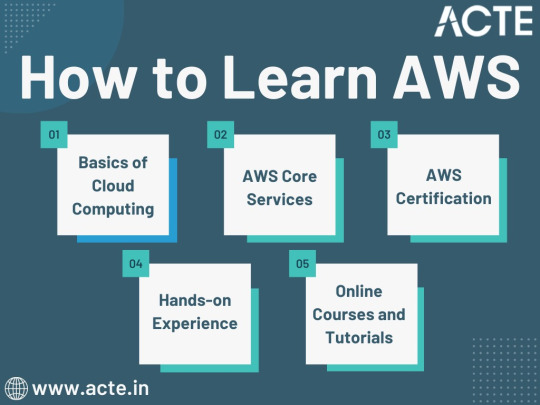
Amazon Web Services (AWS) represents an exciting frontier in the realm of cloud computing. As businesses and individuals increasingly rely on the cloud for innovation and scalability, AWS stands as a pivotal platform. The journey to AWS proficiency involves grasping fundamental cloud concepts, exploring core services, obtaining certifications, and acquiring practical experience. To expedite this process, online courses, tutorials, and structured training from renowned institutions like ACTE Technologies can be invaluable. ACTE Technologies' comprehensive AWS training programs provide hands-on experience, making your quest to master AWS more efficient and positioning you for a successful career in cloud technology.
8 notes
·
View notes